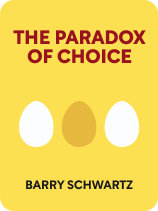

This article is an excerpt from the Shortform book guide to "The Paradox of Choice" by Barry Schwartz. Shortform has the world's best summaries and analyses of books you should be reading.
Like this article? Sign up for a free trial here .
What is hedonic adaptation? Why do things that once excited you become more disappointing each time you do them? Can this tendency be overcome?
Hedonic adaptation is when you really enjoy something the first time you experience it, but the more you get used to it, the less pleasurable it becomes. This tendency is impossible to outrun, but it is possible to learn to live with it.
Learn more about hedonic adaptation below.
Hedonic Adaptation: Explained
What is hedonic adaptation? In his book The Paradox of Choice, Barry Schwartz asserts that even when we make good choices, we often end up disappointed in the long run because of adaptation: When we get used to things, they lose their novelty and we begin to take them for granted.
Adapting to the things that give us pleasure is called hedonic adaptation. Hedonic adaptation can occur as a natural response over time, or in response to a changed reference point. For instance, if you eat a slice of the best chocolate cake you’ve ever had, other chocolate cakes will start to pale in comparison. Because you’ve had a highly pleasurable experience (your new reference point), you’ve unconsciously set your standards higher.
When hedonic adaptation sets in, pleasure is replaced by comfort. Of course, comfort isn’t a bad thing, but when we want to feel pleasure, comfort seems insufficient. For example, if you eat that same chocolate cake again once a week for months, it’ll eventually feel less exceptional than it did at first, becoming more of a regular comfort than a special pleasure.
Schwartz explains that we tend not to expect hedonic adaptation. When we make a choice expecting excitement and pleasure, we don’t realize that pleasure will decline as we get used to it. For example, imagine buying a new pair of shoes you’ve been eyeing for months. You’ll be excited at first, but after a few weeks, the novelty will wear off and you’ll be used to wearing them. We repeat this pattern every time we make a new and exciting purchase, even though we’ve experienced hedonic adaptation before.
| How Much Can We Control Our Happiness? The fact that we can’t control the happiness we get out of experiences over time due to hedonic adaptation raises the question: How much of our happiness and pleasure is actually within our control? Research shows that about 40% of the happiness we experience is under our control—while about 50% of our happiness seems to be genetically influenced and 10% relates to circumstances we can’t control, the remaining 40% is in our hands. This suggests that, while we can’t dictate exactly how much happiness we receive from our choices, we can still affect how much hedonic adaptation impacts our overall happiness. For example, you might not have been satisfied by a recent vacation, but you can improve your happiness by focusing on what you did enjoy about it. |
Hedonic Treadmills
Those who realize the impact hedonic adaptation has on their lives usually learn to live with it—they realize that making purchases or pursuing novel experiences all the time can have diminishing returns. However, others attempt to outrun hedonic adaptation, constantly accumulating new commodities to keep experiencing pleasure.
Schwartz contends that this is an ineffective strategy. Nobody can achieve pleasure all the time through buying exciting new things, and those who seek this strategy end up stuck on a “hedonic treadmill”: constantly pursuing novelty without sustaining it once reached.
| The Link Between Shopping and Unhappiness An example of the hedonic treadmill that most of us have experienced is the desire to buy more and more things. Buying a coveted item, or even a random product that piques your interest, makes you feel good in the moment, yet hedonic adaptation usually kicks in pretty quickly. It can be easy to get trapped in a pattern of purchasing products to get a regular little jolt of pleasure. An Atlantic article about how unfettered shopping can damage supply chains illustrates the futility of buying things to create happiness. The author comments that feeling bad makes people buy things to feel better. Yet studies have shown that accumulating material possessions makes you less happy. Shopping is just one example of how hopping on a hedonic treadmill can make you less satisfied. |
Expanded Choice and Adaptation
Schwartz argues that expanded choice makes our relationship to adaptation more difficult, because we have more opportunities to be disappointed by our choices. Our decisions are also more difficult and time-consuming when we have more options to choose from, meaning that our disappointment can be heightened when we don’t feel as good about a choice as we’d expect. If we spend a lot of time on a choice, we hope it will be satisfying, so it can feel depleting when we lose pleasure we received from a difficult choice.
This problem is heightened for maximizers, since they put more weight on each of their decisions. As maximizers strive for perfection in each of their decisions, feeling dissatisfaction from a decision will make them feel worse than a satisficer who is occasionally dissatisfied with a decision will feel.
| The Benefits of Restricting Pleasure When dealing with adaptation, it might be tempting to search out new opportunities for pleasure, especially if you’re a maximizer who always wants the most pleasurable experience. However, there’s evidence that restricting your pleasure can make you happier. One study showed that a group of people who ate lots of chocolate received less pleasure than another group that had been denied chocolate for a while and then was allowed to eat it at the end of the study. Another study showed that people actually get more pleasure from watching TV when there are commercial breaks. Both of these suggest that when pleasure is occasionally restricted, adaptation doesn’t kick in as strongly. Maximizing, then, appears to be a bad strategy for increasing your pleasure and resisting adaptation. Instead, giving yourself breaks from pleasurable experiences, or saving those experiences for special occasions, will allow you to feel enjoyment without adaptation setting in. |
What to Do About Adaptation
While adaptation can cause challenges, particularly when making decisions about our futures, Schwartz says we can integrate it into our lives by being aware of it. Adaptation can be important when we’re in difficult circumstances, but it can cause unnecessary emotional distress when our circumstances are largely positive. For example, if you move to a new city, you might be excited at first but eventually get used to your new surroundings and second-guess your decision. Even if that city’s the best place for you to live, hedonic adaptation might cause you to feel dissatisfied with it.
Schwartz advises that being aware of the effects of adaptation can lessen its negative effects. When we remind ourselves of the impact of adaptation on our lives, we can work around it and make more informed decisions, knowing we’re likely to adjust to the outcomes. To use the city example again, you could remind yourself that adjusting to a new environment is normal, and growing pains aren’t a sign that you’ve made the wrong choice.
Additionally, Schwartz says that practicing gratitude can help. If adaptation is defined by taking things for granted, actively practicing gratitude for the positive aspects of our lives can help to counteract this.
| Counteracting Hedonic Adaptation Besides gratitude, several other strategies can help to address the negative effects of hedonic adaptation: 1. Focus on experiences, rather than results. For example, if you’re planning a vacation, you’ll feel better by staying in the moment and appreciating each day, instead of worrying over whether it’ll be a good or a bad vacation. 2. Imagine downward counterfactuals—thinking about how your circumstances could be worse. This can help to put your situation in perspective. 3. Give back to others. Activities like volunteering, donating to charity, or helping loved ones can help you focus on others, rather than worrying about satisfying yourself. Another way to counteract the negative emotional impacts of adaptation is to add variety to your life, according to a study from psychologists Kennon Sheldon and Sonja Lyubomirsky. When we vary our experiences, we’re less likely to feel the effects of adaptation. While this doesn’t mean we should be chasing novel experiences constantly, seeking out variety can improve our happiness. For instance, if you get used to a restaurant you like, you can try going to a few new restaurants. |

———End of Preview———
Like what you just read? Read the rest of the world's best book summary and analysis of Barry Schwartz's "The Paradox of Choice" at Shortform .
Here's what you'll find in our full The Paradox of Choice summary :
- Why the more choices we have, the more stressed and indecisive we feel
- How to better navigate our choices, from groceries to health insurance
- Whether it's better to seek the best or accept "good enough"







Dear Hannah,
I really enjoyed reading your article about hedonistic adaptation. Just today I found out that it impacts our lives more than I innitaly thought it would, so I decided to learn more about the topic and your article has given me a great, in-depth introduction into it.
I think it is important to dodge this trap and help our loved ones avoid it, as falling into the hedonic treadmill, while I think about it, means either a) generally, not enjoying life as much, which is something I have to admit to myself or b) leads to consuming more and more (either drugs, you mentioned shopping or eating chocolade, or in my and my families and friends case, binge watching youtube etc.)
What I am not quite sure I underdstand the difference of getting some variety into our lives and seeking novelty. Would you say it boils down to doing something while being mindful and not trying to squeeze an unrealistic ammount of pleasure out of things?
I appreciate you writing the article, thanks for reading my reply.
Sincerely 🙂
Alex